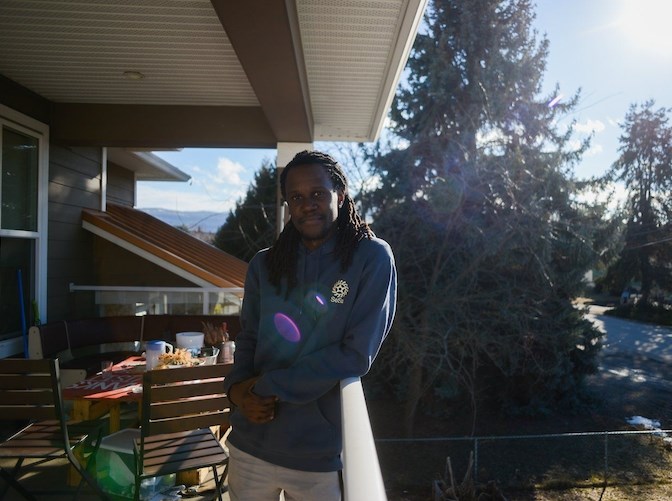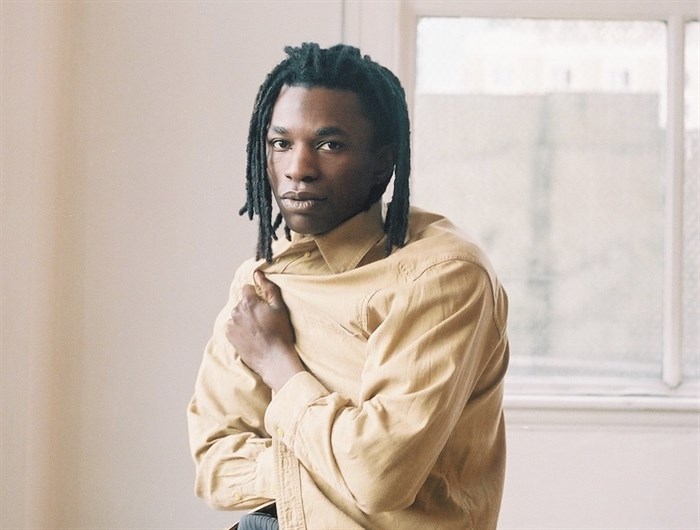
The curator of "Black Boys Don’t Cry" Trophy Ewila expresses his gratitude to Yaw Obrenu Yamoah for creating a space for the Black community in predominately-white Kelowna.
Image Credit: Kelsie Kilawna, Local Journalism Initiative
February 25, 2021 - 8:00 PM
In the midst of dealing with the pandemic and growing anti-racism movements across North America, Yaw Obrenu Yamoah was also busy last year writing his first short film.
"Black Boys Don't Cry" is set to premiere on Feb. 26 at 6 p.m. until 7 p.m. in the Kelowna Cultural District on the RCA Commons fields between the Rotary Centre for the Arts and the Kelowna Art Gallery.
“It just felt like yes, it’s the time to get this out, for everyone to understand what it means to be in this,” Yamoah said over FaceTime. “Last year was the highest it’s ever been for black youth killing themselves. I just thought I gotta do this.”
His roughly three-minute film titled "Black Boys Don’t Cry" responds to high suicide rates among Black youth in North America, he explains.
“Black males, five to 11 years, are more likely to die by suicide compared to their White peers," according to the 2019 report Ring the Alarm: The Crisis of Black Youth Suicide in America. "The suicide death rate among Black youth has been found to be increasing faster than any other racial and ethnic group.”
It’s a grave reality for the Black community — and something Yamoah has considered deeply in his own life as a Black man, he says.
Yamoah says that over the past two years, he has taken “inspiration from life,” to address his own realization that a lot of his own personal traumas were left unhealed.
He started asking questions like: “What is Black masculinity? What does it mean for people like us, who are trying to feel, trying to grow in this world?,” he says.
Addressing his own reflections on those questions gave him insight into how other Black men, youth in particular, might be experiencing Black masculinity.
“I started looking at it and I started hearing it,” Yamoah explains.
"While there’s all this fighting, all of this happening, all of us trying to understand something our kids can’t feel. They don’t know how to go outside and feel good in themselves.”
He also started to think critically about how Black women are often the ones upholding the community.
“It’s the Black women that have to deal with us, so if we don’t express ourselves, we put it on them — our mothers, our sisters, our wives,” Yamoah says.
When he finished writing the short, he sent the script to Trophy Ewila, determined that even with “just a small crew,” they could make it happen.
Ewila immediately connected to what he read and agreed to be the curator for the short film. He reflects on his own experience with Black masculinity, as he sits in his living room, surrounded by art and instruments.
“It’s an important conversation to be able to be comfortable, to just be ourselves, even in public,” he says.
"Black Boys Don’t Cry"
In "Black Boys Don’t Cry" a young boy is depicted waking up at three in the morning, to learn that his cousin has died.
“The film goes on to explore mental health, suicide, loneliness, love and the expression of masculinity within the Black community,” a press release for "Black Boys Don’t Cry" states.
The film brings important attention to several symptoms of colonization and continued violence against Black bodies, Ewila explains.
“In these uncertain times, with so much going on, there is so much emotion that we have to hold, and form this idea of being a man and having to be strong all the time,” Ewila says. “Sometimes it’s a lot, and just to be comfortable with your own imperfections and to be comfortable to say, yo, it’s a lot and release those tears.”
The team shot the short film over three hours, a process that was “beautiful,” Ewila says. “It was an honour to be in that room.”
This experience allowed the participants to embody their authentic selves, he describes, which translated into the character development of the film.
“Everybody was crying in the room. Even I cried, and turned away, because of my own Black masculinity,” he says. “We had to pause and take a break, it was much like a ritual of letting go of those tears that we hold onto.”
Why Kelowna and why now?
Ewila shares that the importance of bringing this film to the Kelowna Cultural District was to create a sense of belonging in a community that — prior to Yamoah breaking ground for the Black community — was predominantly represented by the settler population.
During the uprisings that followed the murder of George Floyd last year, Yamoah says the artist in him was also desperately working to “shine royalty, shine beauty” onto the Black community, which he didn’t see happening.
“I just thought man, Black kids on this earth are killing themselves more than any other race right now. So for me that’s important, because I know what that might feel like,” Yamoa says. “As an artist, you tackle your own life, your own mortality, it’s something that I’ve danced with a little too much.”

Yaw Obrenu Yamoah is a Vancouver-based artist, designer, creator, and filmmaker, praised by Trophy Ewila for creating a space for the Black community in Kelowna.
Image Credit: SUBMITTED
The premiere is doubling as a visual installation where the film will be installed as an art exhibit.
“The positioning of the visual installation in the Cultural District is to celebrate (Yamoah’s) major contribution to culture and inclusivity in Kelowna,” the press release states.
“It is also to highlight the disconnect between major institutions in the Cultural District and the Black artist community in the city. We hope to use this moment to continue a conversation on matters of equity, diversity and inclusion within the Cultural District and in Kelowna at large,” says Ewila.
With COVID-19 in mind, the film and an artist talk will be livestreamed on YouTube.
Ewila says it’s time for the Black community to have space and for local institutions to begin to seek out the people doing the work, instead of asking BIPOC people to check a diversity box.
“We are not just bodies to be used for diversity. We’re also looking for diversity,” Ewila says. “It’s also something that we want, we keep having to look into pockets for our own stories.”
Yamoah has been a “hero” to the Black community in Kelowna, Ewila says, as he has worked tirelessly to encourage Black artists to keep taking space with their stories through art, film, fashion and creating community.
Ewila says it’s because of Yamoah that he’s been able to be the artist that he is today and be the man who will take the space needed for the future of Black youth in the city.
He says becoming a father to his son has heightened the importance of this work, to create a space for his child to grow in an environment he can recognize his own beauty, and express his emotions.
“I sometimes struggle taking him to the park, and I just watch him play and he’s laughing and he’s enjoying life… all I can say is ‘I hope this world doesn’t take that from you,’” says Ewila.
“We want to have more options for him to see himself out there in public, to see different facets of himself out there I think that’s really the inspiration from the playground to let you try and find your community to have more spaces to be around your vibe and not just being seen as a body all the time.”
Ewila hopes this project and those like it will benefit his son, and other Black youth, carving out safer and more vibrant spaces for them to be the unique complex people they are.
— This story was originally published by The Discourse.
News from © iNFOnews, 2021